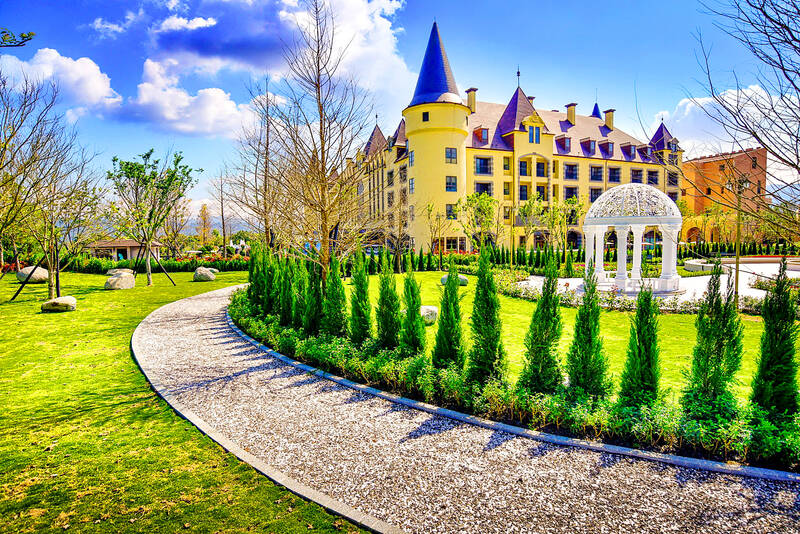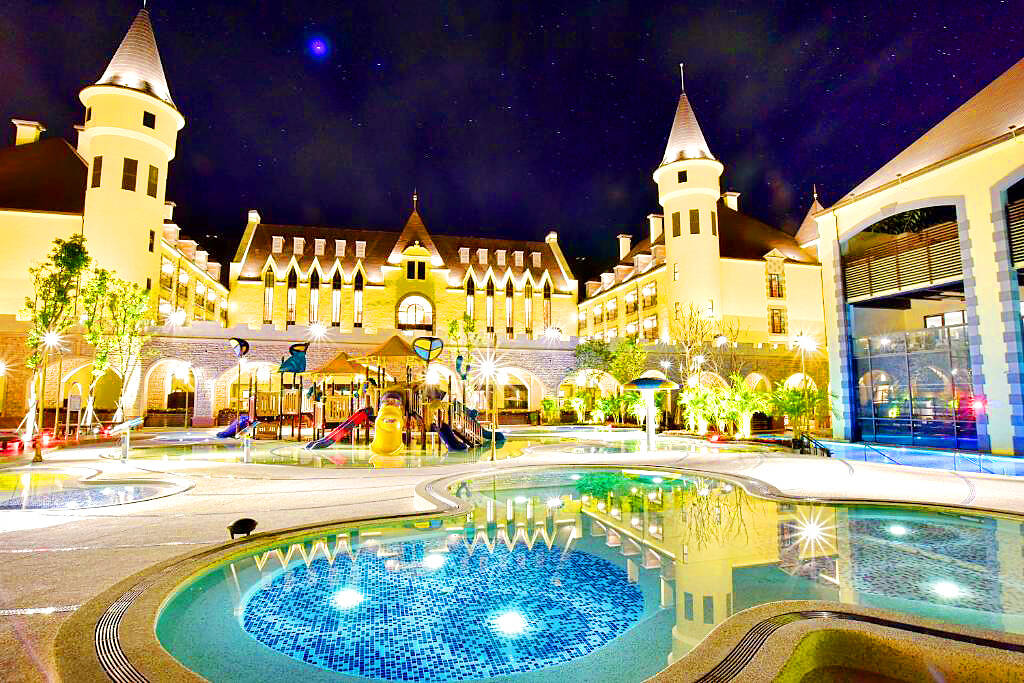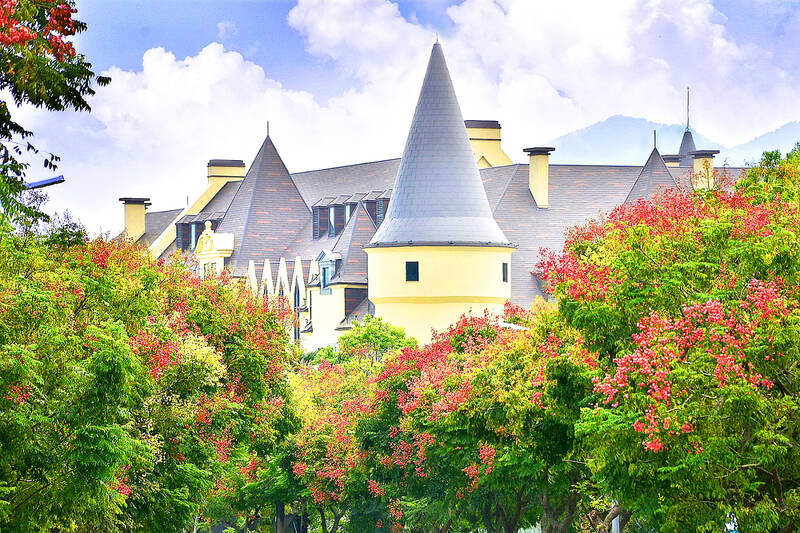Cosmos Hotel & Resorts Group (天成飯店集團) sees both opportunities and challenges in growing its business this year, as the nation’s economy is gaining momentum, but Taiwanese tourists prefer to travel abroad, a company official said.
Like most peers in the tourism industry, the Taipei-based hospitality group last year reported a fast recovery in sales of hotel rooms, as well as food and beverage, but still missed pre-pandemic levels by a small margin.
Occupancy rates have stood above the 90 percent mark at its urban Cosmos Hotel Taipei (台北天成大飯店) near Taipei Railway Station and Taipei Garden Hotel (台北花園大酒店) near Ximen MRT Station, thanks to their convenient locations and border reopenings worldwide.

Photo courtesy of Cosmos Hotel & Resorts Group
“The group is eyeing further business growth this year, focusing on motivating international tourists to travel outside of Taipei,” group marketing and communications head Blithe Chao (趙芝綺) said on Tuesday.
Taiwan’s services account last quarter recorded a deficit of US$1.63 billion, mainly due to the overseas travel frenzy, the central bank said on Tuesday.
Several surveys showed that Taiwanese intend to take more trips overseas this year, which is unfavorable to domestic tourism.

Photo courtesy of Cosmos Hotel & Resorts Group
The Tourism Administration has said that it aims to attract 12 million foreign tourists this year, from 6.4 million last year, by luring international travelers, especially those from India and Southeast Asia.
Hong Kong, Japan, South Korea, the US and Vietnam topped the list of the five largest sources of international travelers to Taiwan last year, government data showed.
Meanwhile, Japan, China, South Korea, Vietnam and Thailand were the most favored travel destinations for Taiwanese tourists, the data showed.

Photo courtesy of Cosmos Hotel & Resorts Group
Cosmos Group has to fill the shortfall in Japanese and Chinese tourists to achieve its business target, Chao said.
The yen’s depreciation is dashing hopes for a solid increase in Japanese tourists, while sour cross-strait ties weigh on the number of tourists from China, she said.
Japanese media recently reported that travel to Taiwan is no longer an inexpensive option in light of a softer yen and inflation in Taiwan.
Grand Cosmos Resort Ruisui (瑞穗天合) in Hualien County, one of Taiwan’s two officially recognized hotels that offer above five-star services, is seeking to woo domestic and foreign tourists despite the challenge.
To achieve that aim, the hotel, featuring European castle and mansion designs with 198 guestrooms, is creating a mosaic fresco by an indigenous artist to augment its exotic fairytale appeal and respect for Aboriginal culture, Chao said.
The 23,000 ping (76,033m2) complex in Rueisui Township (瑞穗) enjoyed a steady occupancy of 70 percent in 2022, with an average daily room rate of NT$13,557 partly because Taiwanese were banned from travel overseas and craved for escape to scenic resorts, Chao said.
“The room rates might make it [Grand Cosmos] the highest in Hualien, but each room usually accommodates four guests, all of whom can enjoy buffet breakfasts and most of the hotel’s amenities for free, making it an attractive, cost-efficient choice,” Chao said.
All Grand Cosmos guestrooms offer hot spring bath and resident guests have free access to games, gyms, swimming pools and other amenities, company officials said, adding that guests now have the option of taking painting classes guided by the famed indigenous artist.
Nevertheless, the impressive showing in 2022 presents a challenge, as the low season kicks in after the Lunar New Year and more Taiwanese appear to favor travel abroad, officials said.
The hotel is countering the trend by offering discount room rates of NT$8,500 per night for guests born in March, April or May to celebrate its fifth anniversary, as part of a campaign to stimulate sales.
“Many foreign tourists limit their visit to Taipei and bypass other parts of Taiwan such as Rueisui,” Chao said. “We’re working with farms and select shops nearby to reverse the trend.”
Policymakers can help by promoting tourist attractions other than the Alishan National Forest Recreation Area in Chiayi County and Sun Moon Lake in Nantou County, officials said.
The group is tapping into new enthusiasm among Taiwanese for camping trips by setting up Bon Chill glamping facilities in Taoyuan to attract family travelers, officials said.
Overall, the group is positive about the industry and is gearing up for expanding its portfolio, which would soon include a new hotel in Pingtung County’s Siaoliouciou (小琉球) and the return to central Taiwan with design hotel Cosmos Boutique (天成丰閣) in Taichung, officials said.

KEEPING UP: The acquisition of a cleanroom in Taiwan would enable Micron to increase production in a market where demand continues to outpace supply, a Micron official said Micron Technology Inc has signed a letter of intent to buy a fabrication site in Taiwan from Powerchip Semiconductor Manufacturing Corp (力積電) for US$1.8 billion to expand its production of memory chips. Micron would take control of the P5 site in Miaoli County’s Tongluo Township (銅鑼) and plans to ramp up DRAM production in phases after the transaction closes in the second quarter, the company said in a statement on Saturday. The acquisition includes an existing 12 inch fab cleanroom of 27,871m2 and would further position Micron to address growing global demand for memory solutions, the company said. Micron expects the transaction to

Nvidia Corp’s GB300 platform is expected to account for 70 to 80 percent of global artificial intelligence (AI) server rack shipments this year, while adoption of its next-generation Vera Rubin 200 platform is to gradually gain momentum after the third quarter of the year, TrendForce Corp (集邦科技) said. Servers based on Nvidia’s GB300 chips entered mass production last quarter and they are expected to become the mainstay models for Taiwanese server manufacturers this year, Trendforce analyst Frank Kung (龔明德) said in an interview. This year is expected to be a breakout year for AI servers based on a variety of chips, as

Global semiconductor stocks advanced yesterday, as comments by Nvidia Corp chief executive officer Jensen Huang (黃仁勳) at Davos, Switzerland, helped reinforce investor enthusiasm for artificial intelligence (AI). Samsung Electronics Co gained as much as 5 percent to an all-time high, helping drive South Korea’s benchmark KOSPI above 5,000 for the first time. That came after the Philadelphia Semiconductor Index rose more than 3 percent to a fresh record on Wednesday, with a boost from Nvidia. The gains came amid broad risk-on trade after US President Donald Trump withdrew his threat of tariffs on some European nations over backing for Greenland. Huang further

HSBC Bank Taiwan Ltd (匯豐台灣商銀) and the Taiwan High Prosecutors Office recently signed a memorandum of understanding (MOU) to enhance cooperation on the suspicious transaction analysis mechanism. This landmark agreement makes HSBC the first foreign bank in Taiwan to establish such a partnership with the High Prosecutors Office, underscoring its commitment to active anti-fraud initiatives, financial inclusion, and the “Treating Customers Fairly” principle. Through this deep public-private collaboration, both parties aim to co-create a secure financial ecosystem via early warning detection and precise fraud prevention technologies. At the signing ceremony, HSBC Taiwan CEO and head of banking Adam Chen (陳志堅)